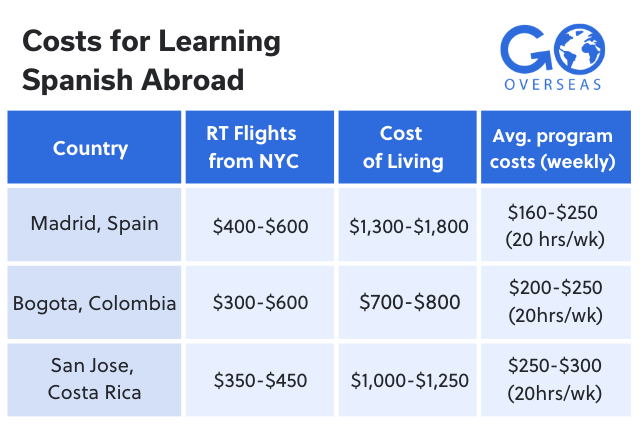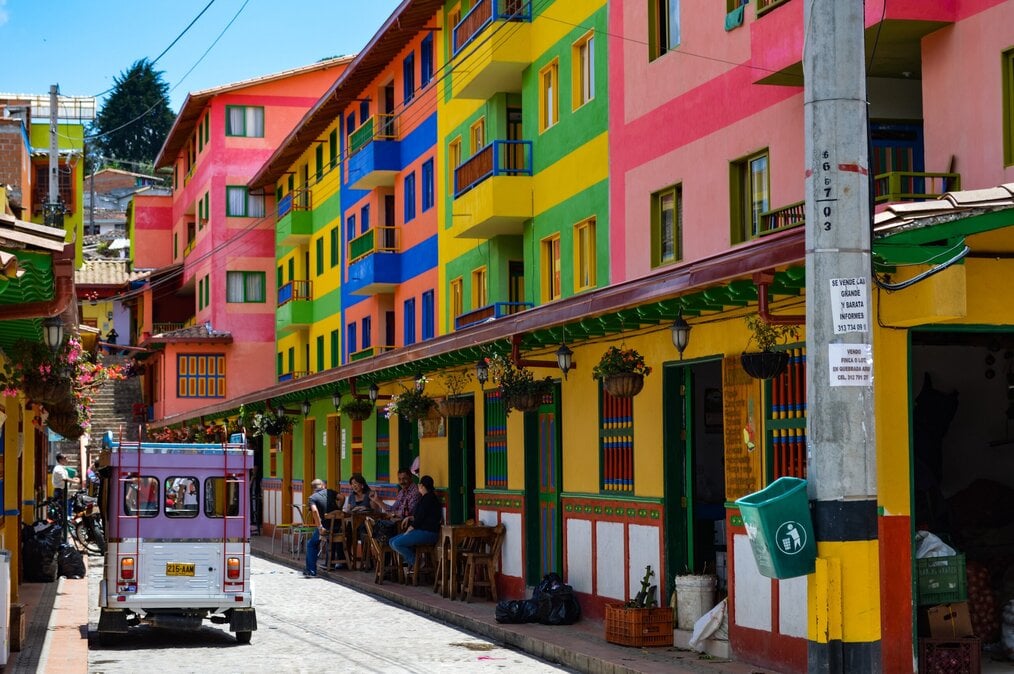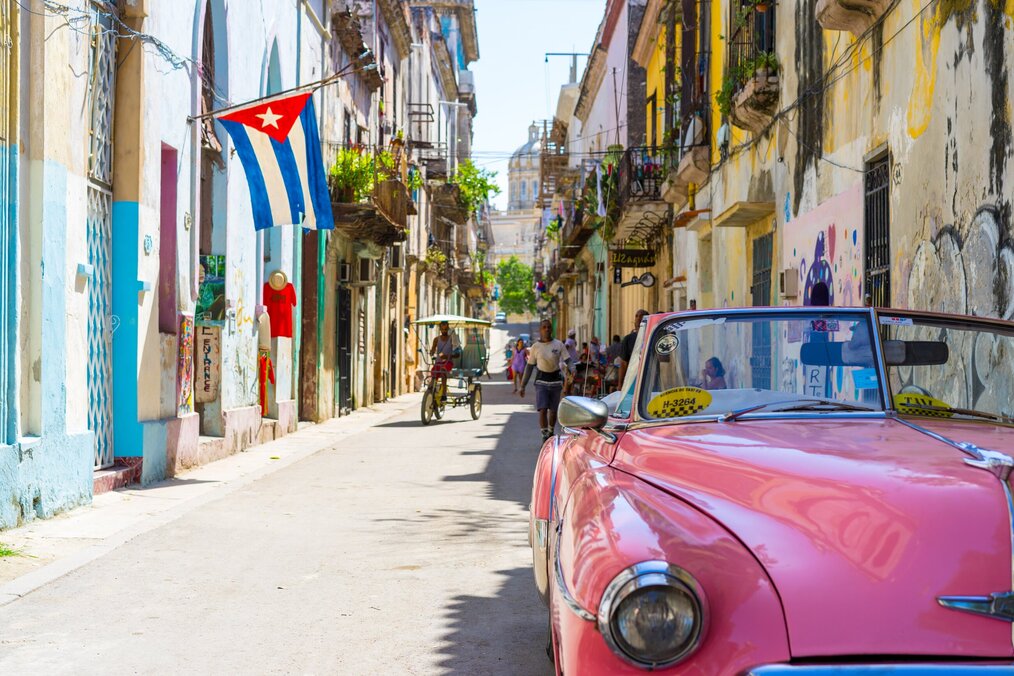
Should You Learn Spanish in Spain or Latin America?
Need help deciding whether you should learn Spanish in Spain or Latin America? Go Overseas compares the two destinations to help you choose.
Key Takeaways 🔑
- Even though accents, grammar, and vocabulary vary across Spanish-speaking countries, you'll be understood by other speakers no matter where you learn.
- Where you go to learn Spanish will depend on your goals, budget, and climate preference.
- Popular countries to study Spanish include Spain, Mexico, Costa Rica, Colombia, and Peru.

Are you studying Spanish or interested in getting started? A great thing you can do for yourself in your language journey is immersing yourself in a Spanish-speaking country. Spanish is an accessible language for English speakers and is spoken in a wide range of countries around the world offering you unique experiences in each one.
Herein lies the problem -- you have so many choices so where do you get started? We're here to help you learn about the differences between learning Spanish in Spain or one of the many amazing countries in Latin America. By the end, you'll be able to start planning the Spanish study abroad of your dreams!
Read more: The 7 Best Places to Learn Spanish Abroad
Where is Spanish spoken?

It's estimated that there are more than 450 million native Spanish speakers worldwide. Spanish is the official language in 20 countries and is widely spoken in the US, Belize, Andorra, and Gibraltar.
Where can you learn Spanish? You have quite a few options available to you.
- Europe: Spain
- The Americas: Argentina, Bolivia, Chile, Colombia, Costa Rica, Cuba, Dominican Republic, Ecuador, El Salvador, Guatemala, Honduras, Mexico, Nicaragua, Panama, Paraguay, Peru, Uruguay, Venezuela
- BONUS! Although not considered Latin America, Spanish is also an official language in this African country: Equatorial Guinea
Spanish in Latin America vs. Spain
There is certainly variety between the accents, grammar, and vocabulary the various dialects of Spanish spoken in Spain versus Latin America.
A look at accents
It's generally accepted that the Southern Cone (Argentina, Chile, and Uruguay) and Caribbean countries have some of the most challenging accents for Spanish learners. Spanish in Spain can also be difficult for newbie learners, though if you've had your foundation in Spain Spanish, it could make sense to continue with this route and learn Spanish in Spain.
If you're an absolute beginner or only know a little bit of Spanish, you'll want an accent that's easier to understand. For you, you're best off learning Spanish in central Colombia, Ecuador, Costa Rica, and Peru.
For Spanish learners with a higher command of the language, or with very specific goals in mind for learning Spanish, your options are much broader, and ease of understanding said country's version of Spanish might not be a deciding factor for where you ultimately learn Spanish.
Video credit: Spanish and Go
Some grammar points
Overall, Spanish grammar is more or less consistent across the various dialects. The only major difference comes from personal pronouns and related verb conjugations -- with vosotros (you all) being predominantly used in Spain, and ustedes more common in Latin America.
Further, Spanish speakers in Argentina, Uruguay, parts of eastern Bolivia, Nicaragua, and Costa Rica will often use "vos" instead of using the common “tú” for the second person singular. The Spanish spoken in these areas is known as Rioplatense Spanish.
Diverse vocabulary
Just like vocabulary across English differs, sometimes even substantially, Spanish speakers will have their own words for the same thing depending on their country of origin. While this can sometimes be confusing, it likely won't hinder your overall understanding if you have enough fluency to pick up the context of a conversation.
Even within one country, you can have several different words for the same thing. For example, in mainland Spain, the public bus is called el autobus while in the Canary Islands, it's called la guagua.
The first time I traveled to Spain to learn Spanish as an undergraduate, I was sharply corrected by a hotel worker when I asked for jugo de naranja instead of zumo de naranja. Either way, I got my orange juice, so whatever vocabulary you use, you'll get what you need in the end.
Things to consider about your destination

Now that we've established that despite differences in grammar, accents, and vocabulary, you'll still be learning a mutually understandable Spanish no matter where you study, you need to consider the following. Narrowing down your top choices will likely be swayed by things like climate and activities instead of who's using vos or tu.
Your budget
If money is a big consideration, the good news is all of the destinations available to you are affordable. Even Spain is incredibly wallet-friendly compared to the rest of Europe. So, regardless of if you choose to learn Spanish in Spain or Latin America, you're bound to find that special place that matches your budget.
Here's an idea of what you could be spending as a student in three popular options:

Climate preference

When you're planning to learn Spanish could also influence where you end up going. Though Spain has relatively mild winters, the best time of year to go to Spain is in the spring and fall. In the northern hemisphere, our winter correlates with most of South America's summer, and Central America's tropical weather makes it more or less great to visit year-round.
Here's a rough guide for the best seasons to study Spanish abroad:
| Country | Best time to visit |
|---|---|
| Spain | Spring and fall; May and October are best |
| Colombia, Venezuela | December to April are best; November and May are great transitional months |
| Central America | Pleasant year-round, but the dry season -- from January to March -- is best |
| Ecuador | January to May |
| Bolivia, Peru, and Paraguay | April to September |
| Chile, Argentina, and Uruguay | Varies; travel to Patagonia in December to March; the beaches in March to May or September to November |
How you want to use your Spanish
Maybe this one is a no-brainer, but deciding where to go to learn Spanish could be as simple as figuring out how you want to use it. For example, if you're a US healthcare worker who wants to better serve Spanish-speaking patients, you may want to choose a destination south of the border. Not only will the vocabulary be better matched, but understanding your patients' culture is very important, too.
Popular destinations for Spanish language learners
Every Spanish-speaking country has something exciting and unique to offer prospective students. If you're still not clear where to go though, here are some of the most popular destinations.
Read more: The 7 Best Places to Learn Spanish Abroad
Spain

- Average monthly cost of living: $950-$1,350
- Top cities: Madrid, Barcelona, Seville
- Things to do: La Tomatina, Sagrada Familia, Royal Palace Madrid
Spain is the birthplace of the Spanish language and is one of the top destinations for students. The sprawling, sun-drenched plazas where you can leisurely have a glass of wine or coffee with friends over tapas are a simple reminder of the slow pace of life. Spaniards work to live and do indeed live well.
Spain is diverse both through its landscapes and its languages. Across Spain, you'll find gorgeous beaches, mountains, bustling modern cities, and tiny, traditional villages. With a rainy climate to the north and baking heat in the south, there really is something for everyone in Spain. Spain is also home to a mix of cultures and regional languages. The Basque Country and Catalonia are just a slice of the rich tapestry of history Spain has to offer.
Mexico

- Average monthly cost of living: $650-$1,000
- Top cities: Mexico City, Merida, Puebla
- Things to do: Tulum Archaeological Site, Palacio de Bellas Artes, Cenote Dos Ojos
Mexico has undoubtedly influenced its northern neighbor and added many iconic things to US culture. From food, music, and language, Mexico is a highly recognizable destination for other North Americans.
From the artsy and vibrant Mexico City to the historic Mayan ruins of Tulum, Mexico is a wonderful mix of old and new without being pretentious. Students in Mexico can eat their way through the superior food scene after a day of classes or hike one of the beautiful national parks on the weekend.
Costa Rica

- Average monthly cost of living: $750-$1,100
- Top cities: San Jose, Heredia, Arenal
- Things to do: Manuel Antonio National Park, Arenal Volcano National Park, Monteverde Cloud Forest
Costa Rica is a country that embodies a carefree vibe. It's a great place for students who love the outdoors and want to be active. There's no shortage of things to do outside, whether your preference is lying on the beach, catching some waves, or hiking through the rainforest to catch a glimpse of the local wildlife.
Ticos (the name for Costa Ricans) embrace the "Pura Vida" lifestyle and everything it entails. Life is worry-free and people enjoy nature, family, and friends. Spanish language students in Costa Rica will have plenty of opportunities to experience this way of life both inside and outside of the classroom.
Colombia

- Average monthly cost of living: $500-$800
- Top cities: Bogotá, Medellín, Cartagena
- Things to do: Tayrona National Natural Park, Rosario Islands, San Felipe de Barajas Castle
Colombia, known for its coffee, is an incredibly biodiverse country. When you pair the beauty of the landscape with the beauty of Colombia's people and culture, you have a great place to study Spanish. The Colombian accent is considered to be one of the most neutral so it's also great for beginners.
Dance is an important part of the culture in Colombia and with dancing comes music. Outside of the classroom, why not take advantage of this and learn salsa or cumbia? If dancing isn't your thing, Bogotá is a colorful city famous for it's street art.
Read more: The 9 Best Spanish Immersion Programs Around the World
Peru

- Average monthly cost of living: $600-$850
- Top cities: Lima, Cusco, Arequipa
- Things to do: Machu Picchu, Lake Titicaca, Colca Canyon
When you think of Peru, you probably think Machu Picchu. Indeed, Peru is a country rich in cultural heritage making it a great place for history lovers. Those who love outdoor exploring will be right at home trekking through the Peruvian Amazon or along the Inca Trail.
Studying Spanish in Peru is a great option for beginners and more advanced students alike. Like Colombia, the accent in Peru isn't as strong as in other Spanish-speaking countries (ahem, Argentina). Peruvians are also said to be very welcoming to foreigners so you'll likely have no shortage of opportunities to practice your skills as you experience this beautiful country.
Where will you go?

Learning Spanish will open doors whether your goals are personal or professional. Despite the differences between the many dialects, you'll still be able to communicate with millions of native speakers worldwide. Invest in yourself and your future by studying Spanish abroad!
Read more about learning Spanish abroad:




















